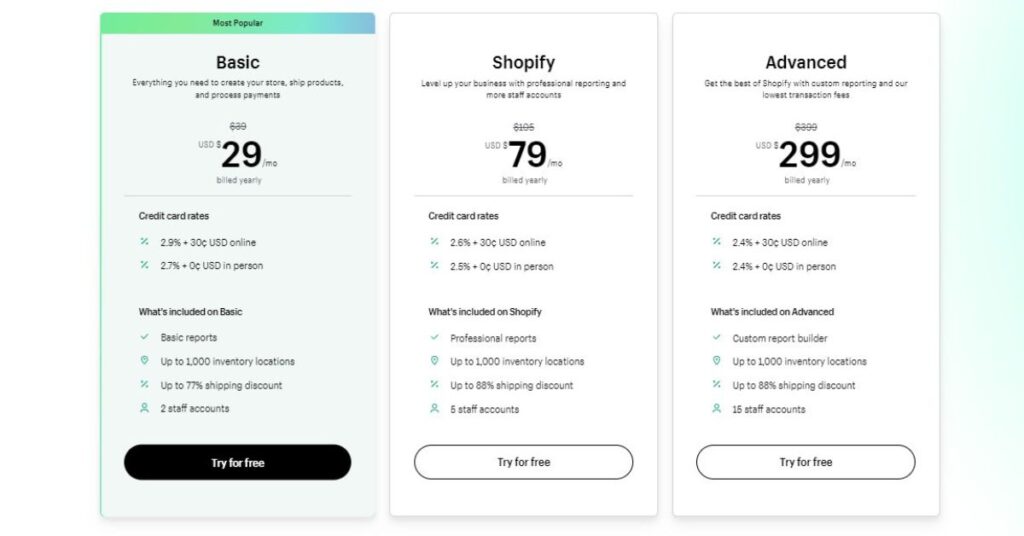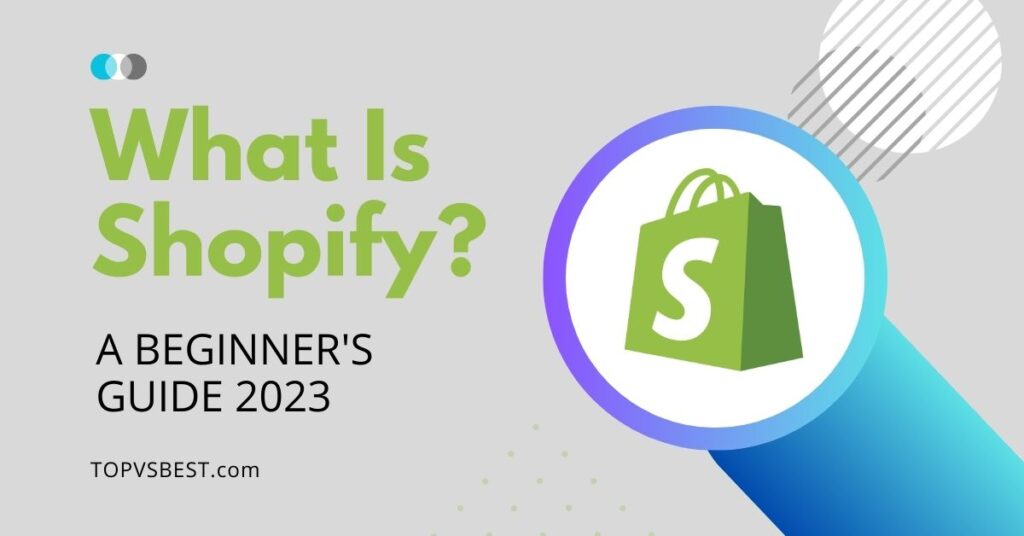Overview
In today’s digital age, e-commerce is becoming increasingly popular and essential for businesses to thrive.
Shopify is an e-commerce platform that has gained immense popularity over the years. It provides businesses of all sizes with the necessary tools to create an online store and sell their products or services.
If you’re new to eCommerce and wondering what is Shopify? This beginner’s guide will answer all your questions on how it works and whether it’s worth it.
In this blog post, we will cover the basics of Shopify, including its features, pricing, and profitability, and provide tips for beginners to get started and succeed.
What Is Shopify?
What is Shopify, and how can it help you sell products online?
What Does Shopify Do?
Shopify is an e-commerce platform that provides businesses with all the necessary tools to create an online store and sell products.
What Is Shopify Used For?
The platform allows users to set up a customizable online store, manage their inventory, process payments, and track shipments. It also offers features such as product catalogs, order management, and shipping options.
With Shopify, businesses can easily manage their online presence and streamline their e-commerce operations, whether they start their own brand, drop-ship, sell digital products or services, or even manage POS (point-of-sale) purchases.
Advantages Of Using Shopify
One of the main advantages of using Shopify is its user-friendly interface. The platform is designed to be easy to use, even for those with little to no experience in e-commerce.
Shopify provides businesses with a range of customizable templates and themes to create a visually appealing online store that reflects their brand.
It also offers a variety of payment options, including credit cards, PayPal, Apple Pay, and many more third-party payment options making it convenient for customers to make purchases.
Another advantage of using Shopify is its reliability and security. The platform is built to handle high volumes of traffic and transactions, ensuring businesses can process orders efficiently without disruptions.
Shopify also takes care of security features such as SSL encryption and PCI compliance, which helps protect customers’ sensitive information and builds trust in the business.
What Is Shopify Lite?
This plan is designed for those who want to sell products without maintaining an online store. However, the online store sales channel is not included, and if you plan to create an online store, you will need the Basic Shopify plan.
The plan includes Shopify’s standard features for the POS (point of sale) and Buy Button sales channels, the Analytics page, and finance reports.
With the Shopify Lite plan, users can embed a Buy Button on their personal website or blog.
The Shopify Lite plan offers competitive transaction fees, one staff account, and the ability to sell products in person using the Shopify point-of-sale app and a card reader. Users can also track their business performance with the analytics page, financial reports, and product analytics.
The Shopify Lite plan is not available for new merchants, but current merchants on the plan can still use it.
Comparison With Other eCommerce Platforms
When comparing Shopify with other e-commerce platforms, such as WooCommerce, and Magento, Shopify stands out for its simplicity and ease of use.
While other platforms may offer more customization options, they require a higher level of technical expertise, which can be challenging for beginners.
Shopify also provides businesses with the necessary tools to expand their online presence and reach customers through various channels, such as social media and email marketing.
Fees And Costs

What is Shopify’s pricing structure, and how does it compare to other platforms?
Explanation Of Shopify Pricing
Shopify offers a range of pricing plans to suit businesses of all sizes. The basic plan starts at $29 per month, while the more advanced plans can cost up to $299 per month (if billed annually; by paying annually, users can save 25 percent).
Each plan offers different features and benefits, such as lower transaction fees and more advanced reporting and analytics.
How Much Does Shopify Take Per Sale?
In addition to the monthly subscription fees, Shopify charges a transaction fee for each sale made through the platform.
The transaction fee varies depending on the pricing plan, with the basic plan charging 2.9% + 30 cents per transaction and the more advanced plans charging lower fees.
Additional Costs To Consider
While Shopify provides businesses with the necessary tools to create an online store, there may be additional costs to consider, such as website design and development, marketing and advertising, and shipping and fulfillment. These costs can vary depending on the size and complexity of the business.
Benefits Of Using Shopify’s Payment Gateway
One of the benefits of using Shopify is its payment gateway, which allows businesses to accept credit card payments directly through the platform.
Shopify’s payment gateway is integrated with various payment providers, including PayPal, Stripe, and Authorize.net, making it easy for businesses to process payments and manage transactions.
Shopify also offers competitive rates for credit card processing, which can save businesses money in transaction fees.
While Shopify does come with a cost, it offers a range of features and benefits that make it a worthwhile investment for businesses looking to establish an online store.
By providing a user-friendly interface, reliable security features, and various payment options, Shopify makes it easy for businesses to manage their e-commerce operations and expand their online presence.
While there may be additional costs to consider, Shopify’s payment gateway and competitive rates for credit card processing can help businesses save money in the long run.
Making Money With Shopify
If you are new to e-commerce, you probably wonder what is Shopify and if it’s right for your business.
Can You Make Money Using Shopify?
To make money with Shopify, businesses need to create an attractive online store that offers products or services that customers want to buy.
This involves selecting a niche market, sourcing products, setting prices, and implementing marketing strategies to drive traffic to the store.
Shopify provides businesses with the tools to manage these tasks, such as customizable themes, product management, and marketing integrations.
How Much Does The Average Person Make On Shopify?
The amount of money that people make on Shopify varies depending on various factors, such as the niche market, the quality of the products, and the effectiveness of marketing strategies.
According to a survey by LittleData, the average revenue per customer for Shopify stores in 2022 was $92.
Overall, the success of shop owners varies greatly, but top-performing stores make millions of dollars per year.
Factors That Affect Profitability On Shopify
How profitable is a Shopify store depends on several factors. That can be product selection, pricing strategy, marketing effectiveness, and customer service.
Successful businesses on Shopify have a deep understanding of their target market, offer high-quality products at competitive prices, and invest in marketing strategies that effectively reach their customers.
Good customer service is also essential in building a loyal customer base and generating positive word-of-mouth referrals.

How Do I Become Successful On Shopify?
There are numerous success stories of people who have made significant profits using Shopify.
Gymshark is a prominent example of a successful Shopify store.
This British-based fitness apparel and accessories manufacturer and retailer was established in June 2012 and has since created and distributed its own line of fitness wear.
Gymshark has grown tremendously over the years, and in 2020, the company’s valuation surpassed £1 billion. The majority owner of the company is Ben Francis.
Gymshark’s success demonstrates how a well-designed and effectively marketed e-commerce store, built on platforms like Shopify, can achieve significant growth and success.
There are countless more examples of success on Shopify because the platform provides businesses with the necessary tools to create a profitable online store.
While the amount of money that businesses make on Shopify varies depending on several factors, companies can increase their chances of success by selecting a niche market, sourcing high-quality products, and implementing effective marketing strategies.
The success stories demonstrate the potential for significant profits on the Shopify platform.
Shopify And Business Licenses
Setting up an online store is a straightforward process, but what is Shopify’s policy regarding business licenses?
What Is A Business License?
A business license is a permit that authorizes an individual or company to operate a business legally within a specific location. The requirements for obtaining a business license vary depending on the location and type of business.
Do I Need A Business License To Sell On Shopify?
The short answer is, No. Shopify does not require businesses to have a business license.
But the answer to this question may depend on the location of the business and the type of products or services being sold.
In many cases, a business license is required to sell products or services online, regardless of whether the business is operating through a platform like Shopify.
It is essential to check with local government agencies to determine the specific requirements for obtaining a business license.
How To Obtain A Business License
The process for obtaining a business license varies depending on the location and type of business.
In most cases, businesses need to register with the local government and obtain any necessary permits or licenses. This typically involves filling out an application, paying a fee, and providing documentation, such as a tax ID number or proof of insurance.
Shopify provides resources to help businesses understand the requirements for obtaining a business license and can guide businesses through the process. However, it is ultimately the responsibility of the business owner to ensure that they have obtained all necessary licenses and permits to operate legally.
Businesses operating on Shopify may need to obtain a business license depending on the location and type of products or services being sold. It is essential to check with local government agencies to determine the specific requirements for obtaining a business license.
Shopify can provide resources and guidance to help businesses understand the process of obtaining a business license, but it is ultimately the responsibility of the business owner to ensure that they have obtained all necessary licenses and permits to operate legally.
Is Shopify Worth It?
Pros And Cons Of Using Shopify
Shopify is a popular e-commerce platform that offers many benefits to businesses.
Some of the advantages of using Shopify include easy-to-use website-building tools, customizable templates, and a range of features to help businesses manage their online store.
Shopify also offers secure payment processing, reliable hosting, and 24/7 customer support.
However, there are also some downsides to using Shopify. The platform charges transaction fees on sales made through third-party payment gateways, and some features, such as advanced reporting, are only available on higher-tier plans.
Additionally, while Shopify offers many customizable options, businesses may find that the level of customization is limited compared to other e-commerce platforms.
Is Shopify Worth It For A Small Business?
Shopify can be an excellent option for dropshipping companies or small businesses looking to sell products or services online.
The platform offers affordable pricing plans, easy-to-use tools, and a range of features that can help small businesses manage their online store.
Additionally, Shopify offers many integrations with third-party apps, making it easy for businesses to connect with other services they may use.
However, small businesses should carefully consider the costs associated with using Shopify, including transaction fees and the cost of any necessary add-ons or integrations.
Additionally, while Shopify can be an excellent option for businesses just starting, businesses with more complex needs may need to consider other e-commerce platforms with more advanced features.
Comparison With Other eCommerce Platforms
When comparing Shopify to other e-commerce platforms, businesses should consider their specific needs and goals. While Shopify offers many benefits, other platforms may be better suited to businesses with different requirements.
For example, businesses with more advanced needs may consider using platforms such as WooCommerce or Magento, which offer more extensive customization options and advanced features.
Additionally, businesses looking for a more affordable option may consider using platforms such as Big Cartel or Wix, which offer lower pricing plans.
What Is The Difference Between Shopify And Etsy?
When it comes to selling products online, Shopify and Etsy are two of the most popular platforms. While both platforms offer online storefronts for sellers to showcase their products and reach customers, there are some key differences between the two.
One of the biggest differences between Shopify and Etsy is that Shopify is a fully customizable e-commerce platform, while Etsy is a marketplace that specializes in handmade and vintage items.
With Shopify, sellers have more control over their store’s branding, website design, and marketing strategies. This makes Shopify a great option for businesses looking to build a strong brand presence and establish themselves as a professional online retailer.
In contrast, Etsy has a more limited range of customization options for sellers. However, Etsy does offer a built-in customer base and a unique niche for handmade and vintage items, which can be a major advantage for sellers who fit into that market.
Etsy also handles many of the back-end tasks, such as payment processing and shipping, which can make it easier for sellers to focus on creating and listing their products.
Another key difference between Shopify and Etsy is the pricing structure. With Shopify, sellers pay a monthly fee to use the platform and are charged transaction fees on each sale.
Etsy, on the other hand, charges a listing fee for each item listed and takes a percentage of each sale as a transaction fee. This means that Etsy can be a more affordable option for small sellers who are just starting out.
While both Shopify and Etsy offer online storefronts for sellers to reach customers, there are some key differences between the two.
Shopify is a fully customizable e-commerce platform that is great for businesses looking to build a strong brand presence, while Etsy is a marketplace that specializes in handmade and vintage items and can be a more affordable option for small sellers.
Getting Started On Shopify

How To Sign Up For Shopify
Signing up for Shopify is easy and straightforward. Simply visit the Shopify website and click on the “Sign up now” button.
For a limited time, you can also try Shopify for FREE for 3 days and three months for $1/month afterward.
You’ll be prompted to enter your email address and create a password. Once you’ve done that, you’ll be taken through a few steps to set up your store.
Setting Up Your Shopify Store
After you’ve signed up for Shopify, you’ll need to set up your store. This involves adding your business information, setting up payment and shipping options, and customizing your store’s design.
Shopify offers many customizable options, so you can make your store look and feel exactly how you want it to.
Choosing A Theme For Your Shopify Store
Shopify offers a range of customizable themes that you can use to design your store. These themes are pre-built designs that you can modify to suit your needs.
When choosing a theme, it’s important to consider the look and feel you want for your store, as well as any specific features or functionality you need.
Adding Products To Your Shopify Store
Once you’ve set up your store and chosen a theme, you can start adding products to your store.
Shopify makes it easy to add products with a simple product creation interface that allows you to enter all the information about your products, including images, descriptions, and pricing.
Getting started on Shopify is a simple and straightforward process. By following these steps, you can set up your store, choose a theme, and start adding products in no time.
Whether you’re a beginner or an experienced online seller, Shopify offers a range of tools and features to help you create a successful online store.
For a complete step-by-step guide on how to set up your Shopify store, read our How To Create Online Store With Shopify In 2023.
Customer Support and Resources

As a small business owner, you probably are curious to know what is Shopify’s customer service like.
Shopify Customer Service Number And Other Support Options
Shopify offers a range of customer support options, including phone, email, and live chat support.
If you have a question or issue with your store, you can contact Shopify’s customer support team for help. You can find the Shopify Contact Support page and log in to your account.
The company does not list the Shopify customer service number on its website. But through web chat and other options, you can receive assistance, including a callback.
Shopify Community Forums And Resources
Shopify has a large and active community of users who are always willing to help each other out.
The Shopify Community forums are a great place to connect with other Shopify users, ask questions, and get advice.
In addition to the forums, Shopify offers a range of resources, including guides, tutorials, and webinars, to help you get the most out of your store.
Is Shopify Good For Beginners? Expert Help
If you need more personalized help with your store, Shopify offers a network of experts and consultants who can assist you.
These experts can help you with everything from setting up your store to marketing and advertising your products. You can find Shopify experts and consultants on the Shopify website.
Shopify offers a range of customer support options and resources to help you build and grow your online store.
Whether you need help with technical issues, marketing and advertising, or anything else related to your store, Shopify has the resources and expertise to help you succeed.

Conclusion
So, what is Shopify?
Shopify is a powerful e-commerce platform that offers numerous benefits to businesses looking to establish an online presence.
From its user-friendly interface to its extensive range of features, Shopify makes it easy for beginners to create an online store and start selling products.
While Shopify’s pricing may seem steep to some, it’s important to note that the platform provides businesses with the necessary tools to succeed. Whether you’re looking to launch a small business or scale your existing business, Shopify is a platform worth considering.
With the right approach, you can achieve success on Shopify and build a profitable online store.



